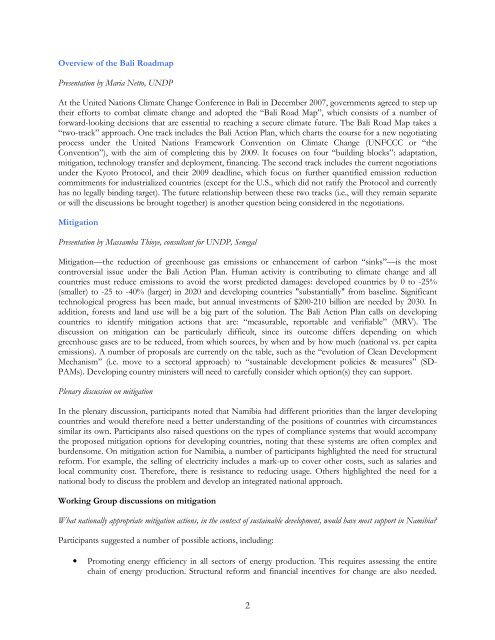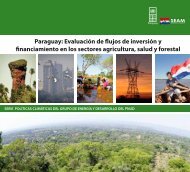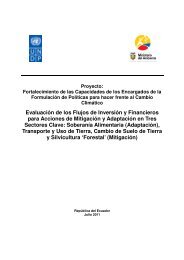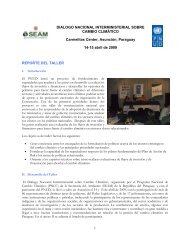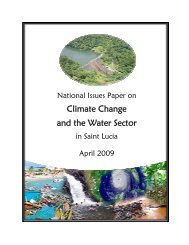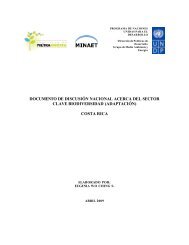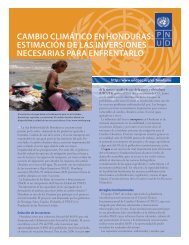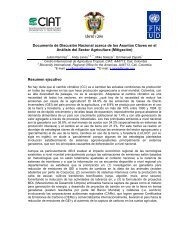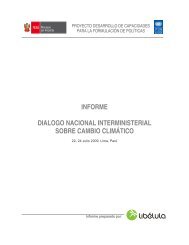national climate change awareness-raising workshop - UNDPCC.org
national climate change awareness-raising workshop - UNDPCC.org
national climate change awareness-raising workshop - UNDPCC.org
You also want an ePaper? Increase the reach of your titles
YUMPU automatically turns print PDFs into web optimized ePapers that Google loves.
Overview of the Bali Roadmap<br />
Presentation by Maria Netto, UNDP<br />
At the United Nations Climate Change Conference in Bali in December 2007, governments agreed to step up<br />
their efforts to combat <strong>climate</strong> <strong>change</strong> and adopted the “Bali Road Map”, which consists of a number of<br />
forward-looking decisions that are essential to reaching a secure <strong>climate</strong> future. The Bali Road Map takes a<br />
“two-track” approach. One track includes the Bali Action Plan, which charts the course for a new negotiating<br />
process under the United Nations Framework Convention on Climate Change (UNFCCC or “the<br />
Convention”), with the aim of completing this by 2009. It focuses on four “building blocks”: adaptation,<br />
mitigation, technology transfer and deployment, financing. The second track includes the current negotiations<br />
under the Kyoto Protocol, and their 2009 deadline, which focus on further quantified emission reduction<br />
commitments for industrialized countries (except for the U.S., which did not ratify the Protocol and currently<br />
has no legally binding target). The future relationship between these two tracks (i.e., will they remain separate<br />
or will the discussions be brought together) is another question being considered in the negotiations.<br />
Mitigation<br />
Presentation by Massamba Thioye, consultant for UNDP, Senegal<br />
Mitigation—the reduction of greenhouse gas emissions or enhancement of carbon “sinks”—is the most<br />
controversial issue under the Bali Action Plan. Human activity is contributing to <strong>climate</strong> <strong>change</strong> and all<br />
countries must reduce emissions to avoid the worst predicted damages: developed countries by 0 to -25%<br />
(smaller) to -25 to -40% (larger) in 2020 and developing countries "substantially" from baseline. Significant<br />
technological progress has been made, but annual investments of $200-210 billion are needed by 2030. In<br />
addition, forests and land use will be a big part of the solution. The Bali Action Plan calls on developing<br />
countries to identify mitigation actions that are: “measurable, reportable and verifiable” (MRV). The<br />
discussion on mitigation can be particularly difficult, since its outcome differs depending on which<br />
greenhouse gases are to be reduced, from which sources, by when and by how much (<strong>national</strong> vs. per capita<br />
emissions). A number of proposals are currently on the table, such as the “evolution of Clean Development<br />
Mechanism” (i.e. move to a sectoral approach) to “sustainable development policies & measures” (SD-<br />
PAMs). Developing country ministers will need to carefully consider which option(s) they can support.<br />
Plenary discussion on mitigation<br />
In the plenary discussion, participants noted that Namibia had different priorities than the larger developing<br />
countries and would therefore need a better understanding of the positions of countries with circumstances<br />
similar its own. Participants also raised questions on the types of compliance systems that would accompany<br />
the proposed mitigation options for developing countries, noting that these systems are often complex and<br />
burdensome. On mitigation action for Namibia, a number of participants highlighted the need for structural<br />
reform. For example, the selling of electricity includes a mark-up to cover other costs, such as salaries and<br />
local community cost. Therefore, there is resistance to reducing usage. Others highlighted the need for a<br />
<strong>national</strong> body to discuss the problem and develop an integrated <strong>national</strong> approach.<br />
Working Group discussions on mitigation<br />
What <strong>national</strong>ly appropriate mitigation actions, in the context of sustainable development, would have most support in Namibia<br />
Participants suggested a number of possible actions, including:<br />
• Promoting energy efficiency in all sectors of energy production. This requires assessing the entire<br />
chain of energy production. Structural reform and financial incentives for <strong>change</strong> are also needed.<br />
2


